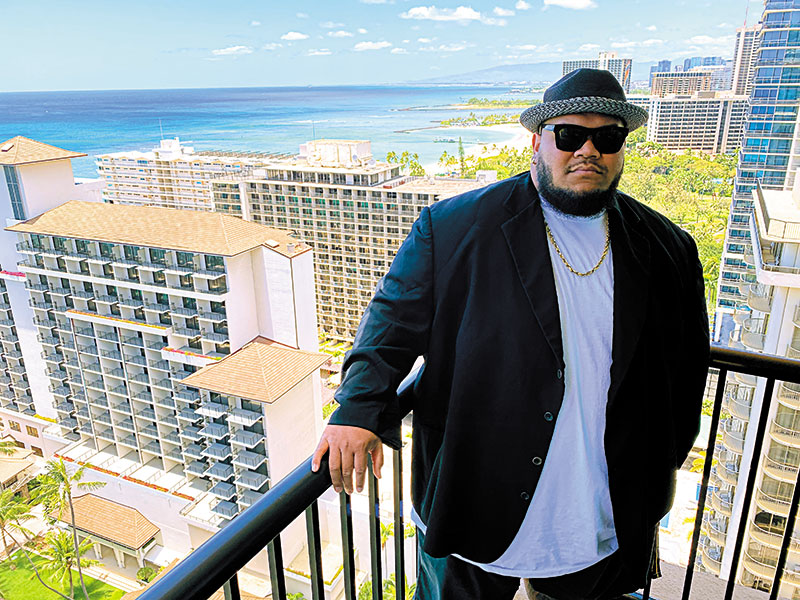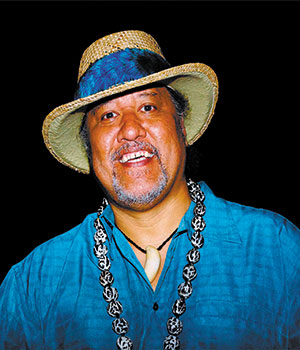Love From Above

Josh Tatofi’s star continues to rise among lovers of Hawaiian mele and R&B balladry, thanks to his velvety smooth voice and rock-solid work ethic.
Just because Josh Tatofi has never held an 8-to-5 job in his life doesn’t mean he’s never learned how to roll up his sleeves and put in an honest day’s work.
Consider that at 13, he was already gigging nights at bars, and then waking up bright and early the next morning to help his dad deliver cement bags to nearby businesses before jetting off to school. Or that at 22, this self-professed “Waikīkī rat” would “play from 3:30 to 5:30 at one bar, then walk across the street and play at another bar from 6 to 7, then drive to ‘Aiea for another gig that ran from 9 to 12.”
More recently, he’s proven to be quite industrious during the coronavirus lockdown. To soothe his fans’ desire for new material, Tatofirecorded and released a couple of cover tunes (Keali‘i Reichel’s E Ō Mai was one of them), as well as hosted several Face-book Live sessions, which attracted 60,000 viewers. And to satisfy his creative side, he fully immersed himself in a newfound passion: videography. The result: His video production of the Shirley Bassey classic Never, Never, Never is expected to be unveiled early next month.

Tatofi hangs with one of his music inspirations, Peabo Bryson (center), and his manager Aaron Mikami.
“I’ve been banging out things just about every week because mentally it keeps me busy and, well, I’d drive myself insane just sitting inside my room,” confesses Tatofi, who describes himself as “a big fan” of hard work. “If you’re not motivated to release new content, you get dropped by listeners real fast. That’s how today’s industry works. If they don’t see or hear from you, they don’t think you’re playing music.”
Fortunately, Tatofiis not a musician many would ever consider dropping. With the release of his seminal album Pua Ki‘ele in 2016 and his highly anticipated follow-up Ua Kui A Lawa last year, he’s successfully won over the hearts of listeners from near and far, thanks in part to his ease at navigating through diverse genres such as island reggae, pop and country.
Yet despite all that versatility, Tatofi— who recorded his first album with the Hawaiian reggae outfit Ekolu in 2009 — is quite clear on what he and band mates Travis Kaka and Laupepa Letuli really are:

The artist celebrates “Josh Tatofi Day” with his manager, bandmates and father after the city presented him with the honor in December 2017. PHOTOS COURTESY JOSH TATOFI
“We are Hawaiian music musicians who also sing R&B love songs,” he states adamantly.
By choosing to perform traditional Hawaiian mele — compositions that are first written in his native Tongan language and later translated by others into Hawaiian — Tatofihas attracted a swath of dedicated followers throughout the hula universe. Just as importantly, his ability to smoothly croon R&B ballads has expanded his audience and turned him into one of the most in-demand artists around. Of particular note, his annual Valentine’s Day show at Pomaika‘i Ballrooms in Honolulu has become an ideal holiday outing for hundreds of couples longing for a dose of heaven-sent love songs from the artist known as “the Polynesian Luther Vandross.”
“We’re definitely in a super sweet spot right now,” says Tatofiwhen asked about the direction of his career and his live performances, which feature him on bass, and Kaka and Letuli on guitar and accompanying vocals. “Of course, the people made us the wedding singers, the love song singers — they proclaimed us as those guys. And once fans start having a say in who you are, you can’t deny that calling.”
That calling would appear to include additional music honors in the coming months. Nominated in eight categories for the 2020 Nā Hōkū Hanohano Awards — most notably, Male Vocalist of the Year, Album of the Year (Ua Kui A Lawa), Song of the Year (For the Lāhui and Hawaiian Music Video of the Year (Melia) — Tatofifigures to walk away with his fair share of “stars” when the annual awards ceremony is held Sept. 10 at Hawai‘i Convention Center.
All of which is very humbling for the man who already has two Nā Hōkū Hanohano awards on his résumé.

With bass in hand, Tatofi entertains guests at the 2018 N˚ H˛k˝ Hanohano Awards show. PHOTO COURTESY JOSH TATOFI
“It’s just a blessing to be considered as a finalist in all the categories by all the members and my fellow peers,” says Tatofi, who’s also up for Best International Pacific Artist at this year’s New Zealand-based Pacific Music Awards.
As far back as the eighth grade, Tatofi could see that his future lay in the entertainment industry.
There was just one problem. He wanted to be a balladeer, a choice that he claims did not sit right with his father, Tiva Tatofi, who used to thump the bass and sing background vocals for the consummate party group Kapena.
The younger Tatofiwould hear his dad’s rationale and understand. “Son, everybody sings ballads,” Tiva would say, “so you gotta sing faster songs!”
Still, Tatofi knew that while the island reggae stylings and overall energy of Kapena were thrilling, he preferred to remain true to the artists he grew up on and loved — namely, Boyz II Men, Marvin Gaye, Peabo Bryson, Journey and Vandross, of course.
Committed to doing it his way, Tatofi began playing keyboards with a band at various bars on Maui. But with each passing year, the late-night gigs — coupled with his other schedule demands, which included homework and football practice at Baldwin High — began to take their toll. Soon after his senior year began in 2008, the sleep-deprived youngster was caught napping in class one too many times. When a teacher finally asked why he was always tired, he told her the truth — that he was a bar-performing musician only getting “three to four hours of sleep each night.”
That revelation led to a parent-teacher conference. In recalling the meeting, Tatofi explains, “It was actually kind of shame. My dad came in and the teacher says, ‘You know, Mr. Tatofi, your son comes to class tired and he lies to me about working in a bar from 10 to 1.’ And my dad’s like, ‘Yeah, um … you know I told him to let go of one of the gigs.'”
The verification shocked the teacher, who immediately apologized for assuming the worst of the teenager.
In further explaining his circumstances back then, Tatofi says, “It was a very unconventional childhood for me, but it was all regular to my dad. See, he dropped out of high school in Tonga to go and work on the farm. In my case, he knew I wanted to play, so he gave me a choice: As long as I kept my GPA above 3.0, I could work. “The deal with my mom was that for every hundred dollars I made, I could keep $20 and the $80 went to the house,” adds Tatofi, who credits his family with teaching him to prioritize God and family above all else — values he still holds dear to his heart.
Born on O‘ahu, Tatofi moved to the Valley Isle shortly before high school and immediately after his grandfather’s ascension to pastor at Free Church of Tonga in Makawao.
His family — which includes his mother, Melenaite, and three sisters: Elizabeth, Lavinia and Vika — remains extremely tight-knit and always honest with each other. That’s especially true of his siblings, who chose different career paths than Tatofi.
“It’s probably what keeps my house level because if they were involved in music, I would probably get so irritated,” he says, chuckling. “My sisters bring humility to a whole other level. I’ll be singing and they’ll be like, ‘Can you just shut up?'”
Tatofi has another sister, also named Melenaite, who died in 2011 at age 14 from a rare heart defect. To this day, he continues to honor her through his wardrobe of choice.
“In Tongan culture, when someone in the immediate family passes away, you wear black for three months … I just never stopped wearing black after she died,” he explains. “I mean literally, my whole closet has black clothes. It just became a thing.”
As for Tiva, who works as a foreman at Goodfellow Bros., he eventually came around to his son’s balladeering. He continues to share advice with his son and has been instrumental in keeping Tatofigrounded as the entertainer’s star power rises.
“My dad is always quick to pop the bubble,” Tatofisays. “If I’m going off track or if I think I’m getting too good, he’s always there to remind me.”
In truth, Tatofi already is quite humble by nature as even he can’t believe how quickly he’s become a household name in Hawai‘i and beyond.
“You know, I just wanted to be a guy that’s known for singing in Hawai‘i, maybe write a couple of songs that are cool, hang around Waikīkī, buy some drinks for my friends — that kind of deal,” he says. “But what this music has given me is far beyond anything that I could have imagined.”
Remembering Uncle Willie

Photo courtesy Debbie Kahaiali‘i
With the passing of longtime musician Willie K, Mid-Week asked Josh Tatofito share his thoughts on the man affectionately known as Uncle Willie.
The two had been scheduled to perform at a concert set for July 6 at Blue Note Hawai‘i. Unfortunately, Willie K passed away May 18 following a two-year bout with lung cancer.
“Talk about talent, stage presence and a true entertainer, that was him,” says Tatofi. “Most musicians are well versed in only one or two or three genres of music. Willie K was a master in all genres of music and I think that’s what made him stand out from others.
“One thing that I will take away from my experiences with Uncle Willie would be just to have fun doing what you love ‘cause doing what you love could have an impact on someone’s life, and that someone could be a family member, friend or even a stranger.”





